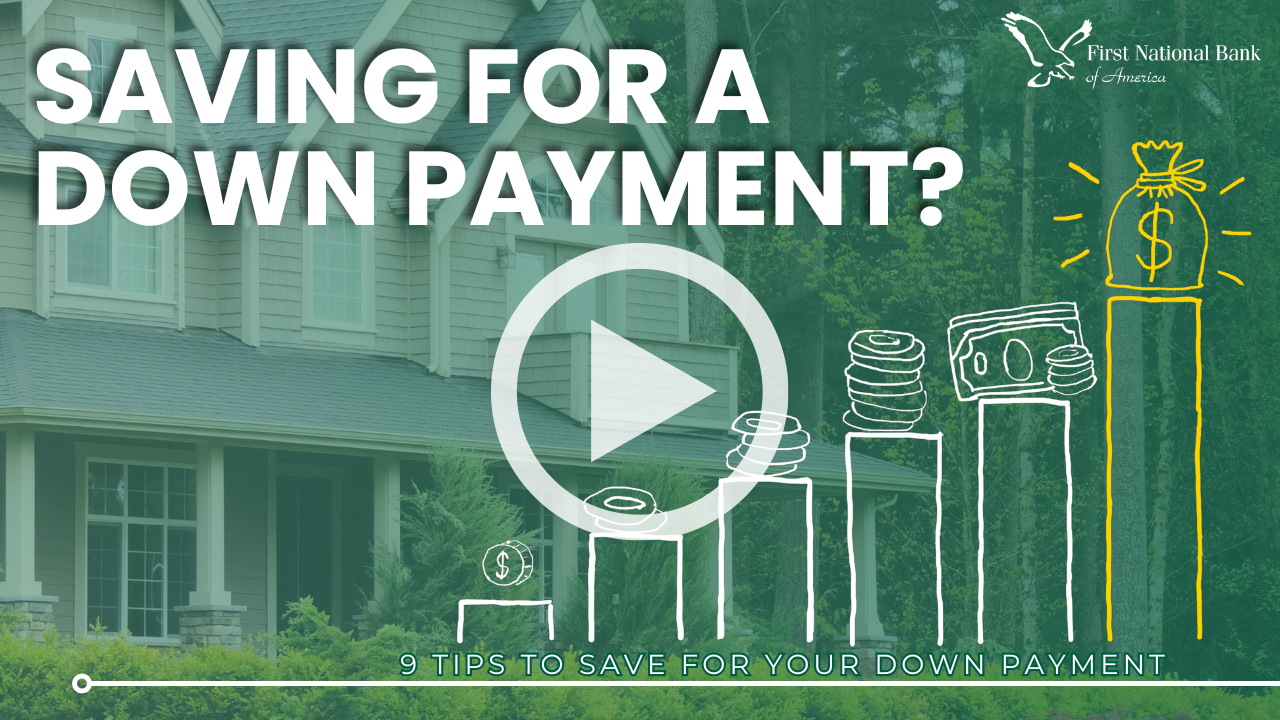9 Ways to Save for a House
Keep reading or watch the YouTube video above for more information.
If buying a new home is something you are considering, saving for the down payment is one of the items that should be top of mind. While accumulating the funds to put down on a home can feel like a big challenge, there are several strategies that can help you grow your savings quicker making it easier to obtain than you think!
Here are a few strategies you can use to kick-start your down payment savings so that you can purchase a home faster!
1. Place your savings somewhere that allows you to earn more money
Choosing a bank or credit union that offers high-yield savings accounts or certificates of deposit (CDs) with competitive interest rates is a great place to start. If you opt to park your funds in a CD, be mindful of your timeframe and don’t opt for a CD that doesn’t mature before you plan on purchasing a home. Letting your money work for you is a sure way to get to your goal a little quicker.
2. Automate your savings
Setting up an automated deposit into the account designated for your down payment is a great way to make sure you are consistently setting aside a portion of your income. If you have direct deposit through an employer, you can ask to have a piece of your check placed directly into that account. If you’re self-employed, scheduling a regular automatic transfer to your down payment account each week/month can help you stay on track.
3. Reduce current expenses wherever you can
Cutting out unnecessary expenses like monthly streaming services such as Netflix, Hulu, ESPN+ and even Amazon Prime. Eliminate eating out when possible or reserve for special occasions. Small changes can add up to big savings.
If you have room, consider taking on a roommate to help cut down on your monthly rent. If taking on a roommate isn’t something you want to do, you could consider downsizing temporarily. Decreasing your current housing cost by any amount will allow you to put more towards your down payment each month.
4. Set a grocery budget and stick to it
According to the USDA, the average person who follows a moderate food budget spends about $350 a month on groceries, so if you have a family of four, that’s nearly $16,000 per year. There are plenty of ways to reduce that dollar amount and still eat healthy. One tried and true method is through meal planning and prep. This can help you decrease your grocery bill, allowing you to put more money in that down payment savings fund!
5. Sell items you no longer use
This is a great way to generate some extra cash! There’s a good chance you have items sitting around that you haven’t used in a while. Leverage online marketplaces like Poshmark, OfferUp, or Facebook to sell those items and boost your savings. The added bonus to this strategy is that you will also be eliminating items that you have to move when it’s time to buy your home!
6. Consider a side hustle
With so many options like Shipt, Uber and DoorDash, picking up a side gig temporarily, can be a great way to make a little extra cash on your free time.
7. Quit Bad Habits (or at least reduce them!)
Bad habits like impulse buying, grabbing takeout/fast food or engaging and other unhealthy things can really add up and cut into your savings strategy. Now is a great time to consider reducing or eliminating these things. Doing so could free up hundreds, maybe even thousands of dollars a year to put towards your down payment.
Did you know….eliminating just one 20oz soda a day can rack up an additional $912 for your down payment?
8. Tackle Debt
This one may seem counterintuitive, but it plays a major role in a mortgage qualification. A debt-to-income (DTI) that’s high can impact your ability to qualify for a mortgage in the first place. DTI is one of the things a lender will look at to determine your interest rate and the amount they are willing to finance, which can impact how much of a down payment you need.
In addition, once you have paid off the debt, you’ll free up additional funds each month that can be placed into your down payment savings!
9. Ask for a gift
FNBA allows customers to utilize gift funds for their down payment. If a family member or friend is willing to help you with the down payment, be sure to document it with a gift letter.
How much should I save for a down payment on a house?
A general rule of thumb is that you should have 20% of the cost of the home to put down when looking at alternative mortgage options. Meaning if you are purchasing a home for $350,000, you will need to have $70,000 available for the down payment ($350,000 x 20%). In addition to the 20% down payment amount, in many instances you will also need to cover any upfront fees (closing costs) on your mortgage. Closing costs can include things like home appraisals, inspections, property recording and transfer fees as well as origination fees. For many mortgage transactions, the closing costs can be anywhere from 2-5% of the home loan amount (not the value of the home).




